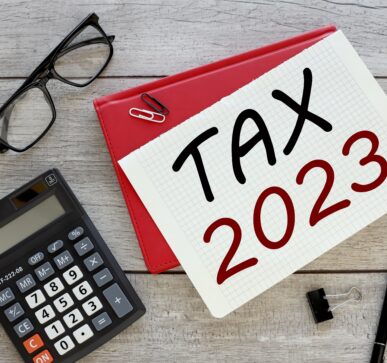Tax planning applies to everyone. On 1/22/24, IRS reminded all taxpayers to start getting ready to file their federal income tax return. Planning ahead can help taxpayers file an accurate return and avoid delays that can slow tax refunds. Going through statements, receipts, tax forms and other financial documents when it’s time to prepare to file 2023 taxes in 2024 can be discouraging for those individuals who haven’t managed their records. A good record-keeping system year-round can make filing 2023 taxes easier by knowing what to keep and how long to keep it. Moreover, good recordkeeping can also assist taxpayers if they receive a letter or notice from the IRS.
The IRS also reminds taxpayers to gather all necessary tax paperwork and records for accuracy to avoid missing a deduction or credit. Taxpayers should have all their important and necessary documents before preparing their return. This will help file a complete and accurate tax return. Errors and omissions slow down tax processing, including refund times.
Best to Wait to file 2023 Taxes until Taxpayers have their tax records including:
- Forms W-2 from employer(s)
- Forms 1099 from banks, issuing agencies and other payers including unemployment compensation, dividends, pension, annuity, or retirement plan distributions
- Form 1099-K, 1099-MISC, W-2 or other income statement if the taxpayer worked in the gig economy. The $600 threshold for payment apps and online marketplaces to report payments on Form 1099-K is delayed for tax year 2023. The threshold for tax year 2023 will continue to be payments over $20,000 and 200 transactions, although taxpayers could still get forms reporting less than that amount. The IRS is planning a threshold of $5,000 for tax year 2024.
- Form 1099-INT if the taxpayer was paid interest
- Other income documents and records of digital asset transactions
- Form 1095-A, Health Insurance Marketplace Statement, to reconcile advance payments or claims Premium Tax Credits for 2023 Marketplace coverage
- IRS or other agency letters
- CP01A Notice with a new Taxpayer Identity Protection PIN (IRS Notice CP01A is sent to taxpayers who are victims of identity theft and have filed Form 14039, Identity Theft Affidavit)
Taxpayers ought to remember that most income is taxable unless it’s specifically exempted by law
IRS stated that income can be money, property, goods, or services. Even if the taxpayer does NOT receive a form reporting income, the taxpayer should report it on their tax return. Income is taxable when the taxpayers receive it, even if they don’t cash it or use it right away.
Taxable income can include payments a Taxpayer receives from:
- Employment: Wages and employee benefits included on Form W-2
- Self-employment or side jobs
- Freelance or independent contractor work
- Goods or services a taxpayer sells online
- Gig work or side jobs, often through apps
- Renting out personal property
- Bartering services or goods
- Royalties
- Businesses, Partnerships, or other business entities
- Investments, capital gains, stock options, splits or trades, interest, dividends
- Digital assets or cryptocurrency
- Benefits paid to the taxpayer such as retirement plan distributions, pensions or annuities, unemployment benefits, Social Security income, some life insurance proceeds and some survivor benefits
- Other types of income such as tax refunds, reimbursements, and rebates, canceled debts, alimony payments, court awards and damages, some scholarships, gambling winnings, prizes, and awards.
Foreign Source Income must be reported
A U.S. citizen or resident alien’s worldwide income is generally subject to U.S. income tax, regardless of where they live. They’re also subject to the same income tax filing requirements that apply to U.S. citizens or resident aliens living in the United States. U.S. citizens and resident aliens must report passive income, such as interest, dividends, and pensions from sources outside the United States unless exempt by law or a tax treaty. They must also report earned income, such as wages and tips, from sources outside the United States. An income tax filing requirement generally applies even if a taxpayer qualifies for tax benefits, such as the Foreign Earned Income Exclusion or the Foreign Tax Credit, which substantially reduce or eliminate U.S. tax liability. These tax benefits are available only if an eligible taxpayer files a U.S. income tax return.
Foreign accounts and Assets must be reported
Federal law requires U.S. citizens and resident aliens to report their worldwide income, including income from foreign trusts and foreign bank and other financial accounts. In most cases, affected taxpayers need to complete and attach Schedule B (Form 1040), Interest and Ordinary Dividends, to their tax return. Part III of Schedule B asks about the existence of foreign accounts such as bank and securities accounts and usually requires U.S. citizens to report the country in which each account is located. In addition, certain taxpayers may also have to complete and attach to their return Form 8938, Statement of Foreign Financial Assets. Generally, U.S. citizens, resident aliens and certain nonresident aliens must report specified foreign financial assets on this form if the aggregate value of those assets exceeds certain thresholds.
Separate from reporting specified foreign financial assets on their tax return, U.S. persons with an interest in or signature or other authority over foreign financial accounts where the aggregate value exceeded $10,000 at any time during 2023 must file electronically with the Treasury Department a Financial Crimes Enforcement Network (FinCEN) Form 114, Report of Foreign Bank and Financial Accounts (FBAR). Because of this threshold, the IRS encourages U.S. persons with foreign assets, even relatively small ones, to check if this filing requirement applies to them.
Who is your professional tax preparer filing your 2023 Taxes? ©





